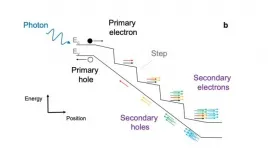A peer-reviewed study published today in JAHA, (Arrhythmia Risk During the 2016 United States Presidential Election: The Cost of Stressful Politics - Lindsey Rosman et al.), is the first to investigate whether a stressful election can trigger potentially life-threatening heart rhythms (cardiac arrhythmias) in people with implanted cardiac devices who have a higher risk of these events.
Researchers examined the incidence of cardiac arrhythmias during the 2016 U.S. presidential election cycle on the heart rhythms in 2,436 adults (average age of 70.8 years, 74.5% white adults, 59.4% male) with implanted defibrillators or pacemakers that were capable of remote monitoring. Patients all resided in North Carolina, a key battleground state subject to a high volume of negative political advertisements and commentary during the 2016 U.S. presidential election.
Researchers compared data from implanted cardiac devices during a six-week span from two weeks before and four weeks after the 2016 U.S. presidential election (late October through early December) with a control period from June to July of 2016, prior to both political parties' presidential nominating conventions.
Compared with the control period there was:
a significant increase in arrhythmias during the 2016 U.S. presidential election: there were 2,592 arrhythmic events during the election period compared to 1,533 events during the control period. a 77% increased risk in the overall incidence of arrhythmias (periods in which the heart beats too fast, too slow or irregularly); an 82% increased risk in the incidence of atrial arrhythmias (an abnormal heart rhythm that begins in the heart's upper chambers); and a 60% increased risk in the rate of potentially life-threatening ventricular arrhythmias (an abnormal heart rhythm involving the heart's lower chambers), which can lead to cardiac arrest. Results were similar when compared to the exact same period one year prior to the presidential election.
"We also found a higher burden of atrial fibrillation (AFib), an irregular and often rapid heart rate, meaning patients spent more time per day in AFib during the election," said Lindsey A. Rosman, Ph.D., lead author of the study and assistant professor of medicine in the division of cardiology at the University of North Carolina School of Medicine in Chapel Hill. "This is important because it can increase the risk of blood clots, stroke and other heart-related complications."
The increase in arrhythmias surrounding the presidential election was not associated with people's age, sex, race/ethnicity, the type of cardiac device, or the presence of high blood pressure, coronary artery disease or heart failure.
Researchers also linked data from the North Carolina State Board of Elections to their database to determine if political party affiliation and community election results were associated with more heart events during the 2016 election.
"We were surprised that we did not observe a higher incidence of arrhythmia among individuals who voted for the losing candidate, who was a Democrats in the 2016 presidential election. Nor did we see more arrythmia among those who may have felt socially or ideologically disconnected from their community, such as a Democrat living in a county that voted for the Republican candidate who won the election, or a Republican in a county that voted for the Democratic candidate who lost the election," Rosman said.
Unlike natural disasters or terrorist attacks, which are also highly stressful and linked to a rise in cardiac events, the fact that political elections are regularly scheduled offers health care professionals the opportunity to anticipate and assist patients in effectively managing stress.
"Attention to mental health issues including stress is an important part of routine clinical care for patients with heart disease and for the general population," said Rosman. "Being more aware of the potential stress of a presidential election could be helpful for many people."
This is a retrospective observational study, therefore, the results cannot demonstrate a direct cause-and-effect relationship between election stress and arrhythmias. Researchers also did not have information on the actual votes of people in the study. However, they note that in North Carolina, 92% of registered Republicans and 94% of registered Democrats voted with their party in the 2016 presidential election.
The investigators are currently conducting a similar study about stress and cardiac events surrounding the 2020 U.S. presidential election, this time with data from a national sample of adults rather than from adults only in one state.
In a separate study, being presented by a different research group at the American Heart Association's EPI conference, (Presentation #063-Racial/Ethnic Differences In Blood Pressure Around The Time Of The 2016 United States General Election - Andrew Hwang et al.) researchers analyzed blood pressure readings collected from nationwide samples of U.S. adults by the National Health and Nutrition Examination Survey (NHANES). Blood pressure measures in the six months prior to the 2016 U.S. presidential election (May 2016 to October 2016) were compared with blood pressure measures of a separate randomly selected group of participants about a year into the new presidency (November 2017 to April 2018). Blood pressure readings among non-Hispanic white adults (1,060 people in the pre-election period and 676 post-election), non-Hispanic Black adults (720 pre-election and 564 post-election) and Mexican American adults (223 pre-election and 468 post-election) were examined separately.
Among their findings:
Systolic blood pressure (the top number in a blood pressure measurement) rose significantly among Mexican American participants (average of 118.0 mm Hg pre-election vs. 121.7 mm Hg post-election). Diastolic blood pressure (the bottom number in a blood pressure measure) increased significantly among Mexican American participants (average of 69.5 mm Hg pre-election vs. 72.6 mm Hg post-election) and non-Hispanic Black Americans (average of 72.2 mm Hg pre-election vs. 74.9 mm Hg post-election). No other population groups had significant changes in blood pressure measures. No significant increases in blood pressure were observed in any racial or ethnic group that did not have previously existing hypertension. "We were surprised to find that blood pressure significantly increased among non-Hispanic Black adults and Mexican American adults who already had recorded high blood pressures, while no significant increases were observed in any group that did not have hypertension before the study period," said lead author of the study Andrew Y. Hwang, Pharm.D., assistant professor of clinical science in the Fred Wilson School of Pharmacy at High Point University in High Point, North Carolina. "We had expected to see some changes among those who did not have high blood pressure before the election. However, it appears that existing hypertension may have a large influence on blood pressure fluctuations related to stress."
Hwang noted that if confirmed, the results suggest that patients with hypertension may be at higher risk for blood pressure elevations related to election stress.
"Close monitoring and follow-up with a primary care professional may be necessary to ensure blood pressure is managed during the election season," he said.
The study has several limitations, including that it is based on samples of people at two different time periods, not on measurements taken before and after the election on the same people. In addition, the designated pre-election control period for this analysis (standard months for NHANES examinations) included most of the contentious period in the months prior to the 2016 presidential election, so stress-related blood pressure increases might have already occurred in those closely following the campaign. The researchers also did not have information about the political party affiliation of study participants.
"Additional research is needed to confirm these findings in larger studies. And future studies should investigate patient-specific factors that may aggravate or protect individuals from adverse health outcomes related to stress," Hwang said.
INFORMATION:
Dr. Rosman's co-authors are Elena Salmoirago-Blotcher, M.D., Ph.D.; Rafat Mahmood, M.D.; Hannan Yang, B.S.; Quefeng Li, Ph.D.; Anthony J. Mazzella, M.D.; Jeffrey Lawrence Klein, M.D.; Joseph Bumgarner, M.D.; and Anil Gehi, M.D. Author disclosures are listed in the manuscript. Rosman et al.'s study was funded by the National Heart, Lung, and Blood Institute of the National Institutes of Health and the North Carolina Translational and Clinical Sciences Institute.
Dr. Hwang's co-authors are Michelle I. Cardel, Ph.D., R.D., and Steven M. Smith, Pharm.D., M.P.H. Author disclosures are listed in the abstract. Hwang et al.'s study received no funding.
Additional Resources:
Multimedia is available on the right column of release link https://newsroom.heart.org/news/2016-u-s-presidential-election-skewed-bp-heart-rhythms-in-those-with-existing-conditions?preview=38700c33dfd1524abd029745424c08f9
Election stress didn't end on Election Day
Stress linked to behaviors that increase heart disease, stroke risk in African-Americans
Stress and heart health
Stress management
For more news from AHA EPI/Lifestyle Conference 2021, follow us on @HeartNews Twitter #EPILifestyle21.
Statements and conclusions of studies that are presented at the American Heart Association's scientific meetings are solely those of the study authors and do not necessarily reflect the Association's policy or position. The Association makes no representation or guarantee as to their accuracy or reliability. The Association receives funding primarily from individuals; foundations and corporations (including pharmaceutical, device manufacturers and other companies) also make donations and fund specific Association programs and events. The Association has strict policies to prevent these relationships from influencing the science content. Revenues from pharmaceutical and biotech companies, device manufacturers and health insurance providers are available here, and the Association's overall financial information is available here.
The American Heart Association's EPI/LIFESTYLE 2021 Scientific Sessions is the world's premier meeting dedicated to the latest advances in population-based science. The virtual meeting will be held Thursday and Friday, May 20-21, 2021. The meeting is focused on the development and application of translational and population science to prevent heart disease and stroke and foster cardiovascular health. The sessions focus on risk factors, obesity, nutrition, physical activity, genetics, metabolism, biomarkers, subclinical disease, clinical disease, healthy populations, global health, and prevention-oriented clinical trials. The Councils on Epidemiology and Prevention and Lifestyle and Cardiometabolic Health (Lifestyle) jointly planned the EPI/Lifestyle 2021 Scientific Sessions. Follow the conference on Twitter at #EPILifestyle21.
About the American Heart Association
The American Heart Association is a relentless force for a world of longer, healthier lives. We are dedicated to ensuring equitable health in all communities. Through collaboration with numerous organizations, and powered by millions of volunteers, we fund innovative research, advocate for the public's health and share lifesaving resources. The Dallas-based organization has been a leading source of health information for nearly a century. Connect with us on heart.org, Facebook, Twitter or by calling 1-800-AHA-USA1.



